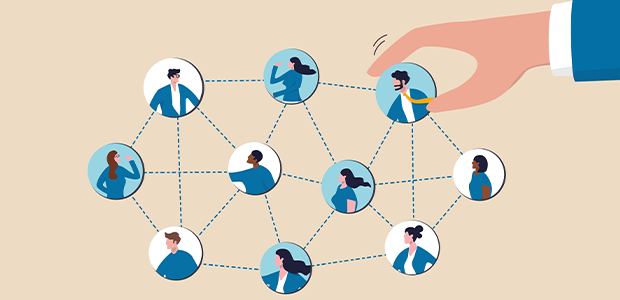
Roles vs capabilities: are communities of skills the future?
For scaleups, traditional hiring practices anchored in rigid CVs, mandated degrees, and predefined job roles can stifle progress. In a fast-paced world where adaptability, innovation, and inclusivity reign supreme, these outdated methods often fall short of meeting the demands of rapid growth. Instead, forward-thinking leaders should consider breaking through the “paper ceiling” and shifting their focus to individuals’ capabilities rather than their past titles.
This shift in mindset allows scaleups to create dynamic teams ready to tackle challenges and seize opportunities as they arise. By adopting a “community of skills” philosophy, scaleups can enhance agility, unlock hidden potential, and leverage their workforce more strategically.
The idea of hiring for potential rather than rigid qualifications is gaining traction across industries. As Steven Bartlett recently shared, in a LinkedIn hiring post: “If someone is talented enough, kind, and willing to work hard, we should be willing to make a role for them in our company.” This people-first mindset resonates deeply with scaleups, where resourcefulness and adaptability are crucial to navigating rapid growth.
Why should scaleups focus on skills over job titles?
As scaleups operate in a fast-paced, high-pressure environment, maximising the value of each team member is essential. A skills-first approach is tailor-made for such businesses, enabling them to build teams that thrive in uncertainty and complexity.
This is the case at Collaborate Global, the experiential agency, founded in 2016, which is now a leading global independent network, growing and growing fast.
As Founder and Global CEO, Ben McMahon puts it: "I’m big on the word ‘enablement’ – how can collaborate enable you as an individual to succeed in your own personal goals? We’re constantly on the prowl for good people. In fact, we’ve taken on people simply because they’re a good fit and we know they can bring value – rather than recruiting to budget, rigid roles, or fill an organogram. This is why we invest a lot in developing and coaching, we want people’s passions and skills to be recognised, valued, and celebrated.”
Here's what a community of skills mindset could bring:
Agility to adapt and scale
In a time constant change, whether it's responding to market shifts, launching new products, or dealing with industry disruptions – recognising overlapping or complementary skills in your workforce, your team becomes capable of pivoting quickly to meet new demands.
Smarter resource allocation
Hiring doesn’t always mean adding headcount. Often, your team already holds untapped expertise. For instance, a marketing lead with coding experience or an operations manager with an eye for design may deliver high-quality results without the cost of a full-time specialist.
Encouraging fresh perspectives
When employees have the freedom to contribute beyond their designated role, they often bring creative solutions to entrenched problems. This collaborative environment is fertile ground for breakthrough thinking, something every scaleup needs to stay competitive.
Elevating your culture
Focusing on skills builds a workplace culture people want to join. Employees are motivated when their full potential is valued, not just their previous experience. This sets the tone for a magnetic, inclusive, and high-performing team.
How can scaleups build a community of skills?
Moving to a skills-first framework doesn’t mean abandoning structure. Instead, it’s about evolving your organisation to optimise for flexibility and team potential. Here’s how scaleups can implement this change effectively:
Create a skills inventory
Take stock of the existing talent in your team. What capabilities lie outside standard job descriptions? A skills audit can uncover hidden strengths and open new avenues for innovation.
Recruit for potential not just credentials
Focus on characteristics like passion, adaptability, and a commitment to growth. These traits often trump specific qualifications, especially in fast-moving organisations that require versatility over formal experience.
Encourage role customisation
Give your team the space to work on projects that align with their interests or talents, even if they’re not part of their core roles. Your product designer might have fresh ideas for branding, or your finance lead may excel at project scoping.
Invest in professional development
Champion continuous learning. Offering resources for skills development or facilitating cross-functional collaborations enables your team to grow in ways that directly benefit your business.
Skills-first thinking is the future
Scaleups achieve success by focusing on what truly matters, adaptability, creativity, and results. By rethinking how you hire and manage talent, shifting the emphasis to skills rather than rigid roles, you can encourage employees to explore new ideas outside their core responsibilities.
This shift enables fresh perspectives, sharpens your ability to respond to change quickly, and ensures your organisation is positioned for long-term growth.
Hiring for your scaleup doesn’t need to involve ticking off boxes on a job spec. Instead, ask yourself a more significant question – what hidden potential can this person bring to our mission?
Employing a “community of skills” strategy transforms scaleups. It allows them to become not only high-performance workplaces but also innovation hubs powered by collective talent. The question isn’t whether you should adopt this approach, but how soon you can start unleashing its benefits.
For more startup news, check out the other articles on the website, and subscribe to the magazine for free. Listen to The Cereal Entrepreneur podcast for more interviews with entrepreneurs and big-hitters in the startup ecosystem.

